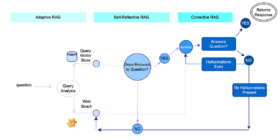Build Advanced RAG with LangGraph
image by author Bringing together Self-reflection, Corrective, and Adaptive systems We all know and love Retrieval-Augmented Generation (RAG). The simplest implementation of Retrieval-Augmented Generation (RAG) is a vector store with documents connected to a Large Language Model to generate a response from a query. This is known as a Single Step Approach. For simple queries this strategy is quite effective, especially if the documents have the answer the user is looking for. However, LangGraph introduced architecture that can enhance the RAG […]


